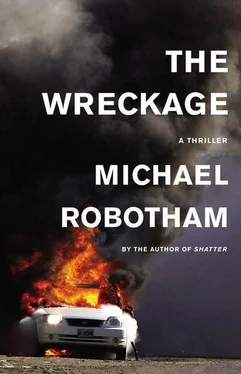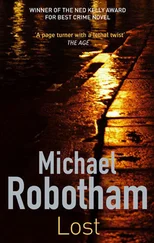Michael Robotham - The Wreckage
Здесь есть возможность читать онлайн «Michael Robotham - The Wreckage» весь текст электронной книги совершенно бесплатно (целиком полную версию без сокращений). В некоторых случаях можно слушать аудио, скачать через торрент в формате fb2 и присутствует краткое содержание. Жанр: Триллер, на английском языке. Описание произведения, (предисловие) а так же отзывы посетителей доступны на портале библиотеки ЛибКат.
- Название:The Wreckage
- Автор:
- Жанр:
- Год:неизвестен
- ISBN:нет данных
- Рейтинг книги:3 / 5. Голосов: 1
-
Избранное:Добавить в избранное
- Отзывы:
-
Ваша оценка:
- 60
- 1
- 2
- 3
- 4
- 5
The Wreckage: краткое содержание, описание и аннотация
Предлагаем к чтению аннотацию, описание, краткое содержание или предисловие (зависит от того, что написал сам автор книги «The Wreckage»). Если вы не нашли необходимую информацию о книге — напишите в комментариях, мы постараемся отыскать её.
The Wreckage — читать онлайн бесплатно полную книгу (весь текст) целиком
Ниже представлен текст книги, разбитый по страницам. Система сохранения места последней прочитанной страницы, позволяет с удобством читать онлайн бесплатно книгу «The Wreckage», без необходимости каждый раз заново искать на чём Вы остановились. Поставьте закладку, и сможете в любой момент перейти на страницу, на которой закончили чтение.
Интервал:
Закладка:
Campbell sucks in his cheeks and puckers his lips reflectively. “If you lodged a complaint against Holly Knight, those items would be regarded as evidence.”
“And I wouldn’t get them back for months.”
The faintest trace of a smile enters Campbell’s eyes. “Sorry, old chap, I can’t get involved. No hard feelings.”
Ruiz isn’t going to forget the feelings.
Campbell wants the final word. “Listen to me, Vincent, this whole ‘don’t fuck with me’ act might have worked when you were still on the job, but you’re a civilian now.”
The commander turns and marches down the corridor, an ordered man with a disordered heart.
12
The Courier watches a skinny black-haired girl in a G-string and high heels undulate around a pole, moving like there’s an itch in her groin that she can’t quite reach. He pulls a twenty from his wallet and tucks it into her G-string, brushing his fingertips along the fabric. She dances away, waggling her finger at him.
She has a pageboy haircut. Black. Straight. A wig. Painted eyes. Red lips. The red reminds him of his first hit, the schoolgirl, the blood that seeped from the corner of her mouth as she lay in the dust, one leg folded under her, her schoolbag still in her hand.
He can’t remember if she was on her way to school or coming home, or if she was just visiting someone at another settlement. She was killed because she was there and not somewhere else. It was a test. His initiation. That was fifteen years ago on the West Bank near the city of Nablus.
He was told that the first killing would be the hardest-a leap of faith across a blood-soaked divide-but in that moment between the recoil and the bullet hitting the target, the blink of an eye, he felt nothing. Each killing since has been an exercise in trying to feel something, some sense of horror or satisfaction or completion.
The second person he killed was an Iraqi dissident, found hanging in a townhouse in San Francisco. Next came an Iranian defector who fell beneath a train in Amsterdam and a Syrian politician who died in a hit-and-run accident in Cairo. The most recent-an Iranian nuclear scientist-was killed by a booby-trapped motorbike, triggered by remote control outside his house in Tehran. State TV blamed “Zionist and American agents.” A smokescreen. Masoud Ali Mohammadi had been leaking details of Iran’s nuclear program to the US.
How many in total? More than a dozen but less than his enemies suspect. Defectors. Dissidents. Spies. Sympathizers. Rivals. Enemies. He does not judge-he carries out the judgment of others.
The girl on the pole has finished her dance. She clomps off stage, retrieving a wad of chewing gum from the edge of a glass. As she moves through the tables, a bouncer steps in to protect her. Later she emerges from her dressing room wearing a midriff top and low-slung jeans. A tattoo ripples across her lower back-the tramp stamp. Forty years from now there’ll be tens of thousands of old ladies trying to hide the ink-pricked follies of their youth.
The Courier sends her a note. Offers to buy her a drink. She signals her interest. Five minutes. He waits.
Yesterday hadn’t gone to plan. The soldier hadn’t capitulated. The Courier had shown him the long-nosed pliers, drawn attention to them, demonstrated, but it made no difference. The soldier had simply smiled at him, a mad grin-that’s what war does to a man, puts spiders in his head.
“I have no desire to kill you,” the Courier told him, “but you took information that didn’t belong to you. Now I must collect it. Just tell me what you did with the notebook.”
The soldier grinned. Died that way.
Now it’s up to the girl. He should never have let her get away. That was careless. He had underestimated her. Most women meekly surrender or go rigid with fear. This one knew how to fight. Survive. Now he can’t get her face out of his mind-her smoky blue eyes and her nice white teeth, slightly overcrowded at the bottom. He remembers the heat of her skin and the smear of her saliva across the back of his hand.
They took her to the police station. There was someone with her, a much older man, solid, but quick on his feet. It didn’t look like he lived on the estate. He was driving an old Mercedes. Should be easy to trace.
13
The new day is a bright orange line on the horizon but already the trees are sagging in the heat and the landscape has blurred to a shimmer. Driving at speed past barricaded shops and bawling vendors, Luca and Jamal cross the Greater Zaab River, withered and brown, into the province of Nineveh. Abu is in the vehicle behind them, never more than a car length away.
Soon the desert stretches out on every side with flat expanses of hardpan between brush-covered ridges and dry creek beds that look like old scars in the earth. Rural Iraq is like something from a Biblical story with men in dishdashas, boys herding sheep and simple mud-brick houses the color of sand.
The traffic is heavier than Luca remembers. Good news. Business is being done. Jobs created. Families fed.
Jamal’s eyes dart back and forth to see if any vehicle has “picked them up.” “Dickers” can be anywhere; sympathizers who punch a number into a mobile phone and summon insurgents to a “soft target.”
Below them at the base of a ravine the remnants of a US Humvee lie twisted and blackened. Fresh tar covers the bomb crater at the edge of the road.
When they reach the outskirts of Mosul they turn east and cross the Tigris. After stopping twice to ask for directions they reach a village too poor to pave its stretch of road. It has one dusty street and a broken line of mud buildings. Four or five men sit outside a cafe, playing poker and drinking tea. Their faces are like the desert-old, worn and craggy. Watching.
Jamal asks about the bodies that were found. One of the men raises a weathered hand and summons a young boy from the kitchen. Barefoot and dressed in rags, the boy sprints ahead, his pink heels flashing in the dust. Jamal and Luca follow, while Abu stays with the cars. Their young guide waits for them to catch up. He runs again, zigzagging through a dusty yard full of half bricks and broken concrete.
Then he stops. Waits. He points at a collapsed house, rubble instead of walls, the roof in pieces; some sort of explosion or implosion. Luca moves closer, stepping gingerly into the debris. He pulls aside a twisted rectangle of tin, stained with rust. Not rust. Blood. Flies lift off and settle again.
Luca retreats, wiping his hands on his shirt. He questions the young boy in Arabic. There were four men inside the house. They were wearing uniforms. The police took their bodies away.
The nearest dwelling is across the street. Luca notices a young girl on the rooftop, sitting beneath a tarpaulin slung from three poles. She’s wearing a scarf drawn across her mouth, peering from beneath the edge of the fabric, not quite looking directly at him.
“Did anyone see what happened?” he asks the boy.
“We were sleeping. My house is there,” he points further along the street. There is a woman hanging washing on a clothesline. The wet clothes are piled in an aluminum case just like the one he saw in the bank vault. On the opposite side of the road an old woman is selling onions and peppers from another case.
“Where did you get this?” he asks her.
“It was not stolen.”
“Where?”
The boy answers, “We found them.”
“Show me.”
Luca follows the boy again, walking between buildings that radiate heat, yet trap the cool behind thick walls. Goats bleat from the shade of a lone tree. Stopping at the edge of a ravine, Luca’s feet have disturbed loose stones that bounce and slide down the steep slope, rattling against bags of household rubbish, discarded clothing, furniture and broken pottery. Scattered on top are more than a dozen aluminum cases. Luca counts them. Including those he saw in the village it makes sixteen. How much money did they contain?
Читать дальшеИнтервал:
Закладка:
Похожие книги на «The Wreckage»
Представляем Вашему вниманию похожие книги на «The Wreckage» списком для выбора. Мы отобрали схожую по названию и смыслу литературу в надежде предоставить читателям больше вариантов отыскать новые, интересные, ещё непрочитанные произведения.
Обсуждение, отзывы о книге «The Wreckage» и просто собственные мнения читателей. Оставьте ваши комментарии, напишите, что Вы думаете о произведении, его смысле или главных героях. Укажите что конкретно понравилось, а что нет, и почему Вы так считаете.












